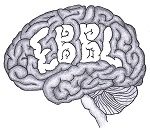
I generally conceptualize Obsessive Compulsive disorder in terms of irrational and persistent thoughts that will go away if ignored for long enough. In this post, I challenge the way I think about OCD (sound meta?) and present up to date information on the little known metacognitive model.
According to dictionary.com, Metacognition is: Higher order thinking that enables understanding, analysis, and control of one’s cognitive processes, especially when engaged in learning. The metacognitive model of OCD was first developed by Flavell and has come to the forefront of OCD research in recent years (Rees & Anderson, 2013). Wells, a theorist about the role of metacognition in OCD, proposes that negative metacognitive beliefs arise from the appraisal of intrusive thoughts and lead to/contribute to OCD symptoms. These metacognitive thoughts specifically relate to beliefs about when to perform and stop a ritual, and thought-fusion beliefs (Rees & Anderson, 2013). A thought fusion belief occurs when an individual believes thinking about something makes it more likely to happen. For example, an OCD patient may experience significant distress after imagining that they are in a car crash because they begin to believe that they are actually going to hit someone with their car. In the rest of this post I will present some of the empirical evidence in support of the metacognitive model of OCD and discuss implications for treatment.
Solem et al. tested the two following hypothesis in their study of Wells Metacognitive model using a variety of self-reported scales assessing OCD symptoms and Metacognitions for data collection:
- Metacognitions will show a significant positive correlation with obsessive-compulsive symptoms.
- Patients with OCD will score significantly higher on metacognitive constructs compared to community controls.
They found a positive and significant correlation between metacognitions about rituals and thought-fusion beliefs, and OCD symptoms. These results provide empirical support for Wells’ model.
Another recent study demonstrated the involvement of metacognitive beliefs in development of OCD symptoms by experimentally manipulating metacognitive beliefs (Myers & Wells, 2013). Participants were placed in a fake EEG and the experimental group was told that they would hear a loud noise if they thought about drinking (induced metacognition). The control group was told that the loud noise they might hear had nothing to do with their thoughts (Myers & Wells, 2013). Results supported the hypothesis that participants in the experimental group, especially those with OCD, would experience more OCD like symptoms and discomfort than participants in the control group. For a detailed discussion of the results and limitations of the study, see the following link:
http://www.sciencedirect.com/science/article/pii/S0005796713000181
There are a variety of empirically tested treatments based on the metacognitive model of OCD. They all aim to improve an individual’s metacognition about the experience of unwanted and obsessive thoughts. I have provided a quick description of three empirically tested metacognitive therapies along with links to learn more and opportunities to participate in clinical trials.
Acceptance and Commitment Therapy: The goal of ACT is to improve quality of life, not necessarily to eliminate all symptoms. Patients are taught to accept their obsessive thoughts instead of trying to suppress them and to think about their thoughts in a less literal manner.
- http://contextualscience.org/act
- http://www.sevencounties.org/poc/view_doc.php?type=doc&id=52497&cn=6
Inference Based Therapy: Based on the premise that OCD symptoms arise from irrational and obsessional doubting. IBT intends to modify the thought processes that produce symptomatic doubting (O’Connor et al., 2009).
- http://www.sciencedirect.com/science/article/pii/S1077722909000947
- http://clinicaltrials.gov/show/NCT01794156
Metacognitive Therapy: “The main approach used in MCT for OCD is to help the client to become aware of their metacognitive processing and to learn to modify these higher-order metacognitions such as beliefs about the importance of thoughts” (Rees & Anderson, 2013).
- http://www.mct-institute.com/metacognitive-therapy
- http://www.youtube.com/watch?v=jdCUiKN6Vqg
- http://clinicaltrials.gov/ct2/show/NCT01483339?term=metacognitive+therapy&rank=5

I hope that this blog post has made you think about the way that you think about OCD (joke intended)! Stay tuned for my next post in 2 weeks.
References:
Myers, Samuel G., and Adrian Wells. “An Experimental Manipulation of Metacognition: A Test of the Metacognitive Model of Obsessive-Compulsive Symptoms.” Behaviour research and therapy 51.4-5 (2013): 177-84. ProQuest. Web. 24 Sep. 2014.
O’Connor, K., Koszegi, N., Aardema, F., van Niekerk, J., & Taillon, A. (2009). An inference based approach to treating obsessive-compulsive disorders. Cognitive and Behavioural Practice, 16, 420–429.
Rees, Clare S., and Rebecca A. Anderson. “A Review of Metacognition in Psychological Models of obsessive–compulsive Disorder.” Clinical Psychologist 17.1 (2013): 1- 8. ProQuest. Web. 24 Sep.
Solem, S., Myers, S. G., Fisher, P. L., Vogel, P. A., & Wells, A. (2010). An empirical test of the metacognitive model of obsessive-compulsive symptoms: Replication and extension. Journal of Anxiety Disorders, 24, 79–86.
http://media-cache-ec0.pinimg.com/originals/f8/ae/13/f8ae13153b8005eb5e2721c4462c8e0f.jpg
http://livelightbeing.files.wordpress.com/2014/04/9682e0cb87c5b5dfb44a9cf9e9e0c66a.jpg?w=580
